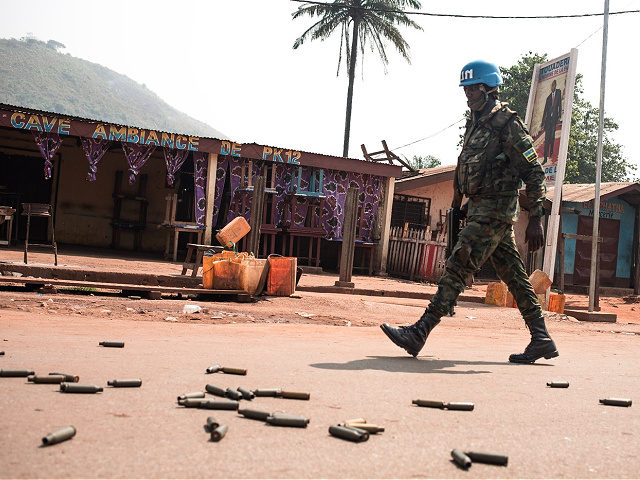At least 100,000 people in the Central African Republic (CAR) have been displaced by fighting between government forces and a coalition of opposition militias in recent weeks, the New Humanitarian reported on Monday.
An estimated 60,000 people have fled CAR for neighboring countries to avoid the internal clashes, “and 58,000 more have been internally displaced within CAR, which already has some of the highest humanitarian needs per capita of any state in the world,” according to the non-profit news agency.
In the southeastern town of Bangassou, the local bishop “estimates that 80 percent” of the local population of 35,000 people fled their homes this month after the rebel militia group Coalition of Patriots for Change (CPC) seized control of the community on January 3. Many of Bangassou’s residents fled across the border to the neighboring Democratic Republic of Congo (DRC), Bangassou’s bishop, Juan-José Aguirre Muñoz told the New Humanitarian.
“[O]n January 2, thousands of people fled Bangassou and crossed the Mbomou River to seek refuge in Ndu, a village across the border in DRC, where MSF is also supporting the local health center,” Doctors Without Borders, referring to itself by its French initials MSF, reported on January 4. The CPC withdrew from Bangassou on January 16.
A local hospital in Bangassou is “hosting around 2,000 people, while a site just outside the town has become the refuge for around 10,000 others who fled their homes,” the New Humanitarian relayed on January 19. In the western CAR town of Bouar, located near the Cameroon border, “more than 5,000 people are displaced in various sites that lack access to water sources and latrines, according to a priest from a seminary hosting displaced people.” The situation on the ground remains volatile, according to the Bouar priest, who declined to give his name to the independent news agency. He said on Monday that some Bouar residents tried to return home in recent days, having convinced themselves that the conflict might be drawing to a close.
“Sometimes, they try to go home,” the priest told the publication. “But then they come back in a hurry.”
Disparate rebel groups aligned to form the CPC on December 19 ahead of CAR’s general election. CAR President Faustin-Archange Touadéra was reelected to the nation’s highest office on December 27 with more than 53 percent of the vote. The CPC has rejected the election results, citing alleged voter fraud. Fighting between rebel groups and CAR government forces caused insecurity during the voting process, meaning “just 35 percent of registered voters were able to cast ballots, according to CAR’s constitutional court – in some locations, electoral papers were burned and polling stations were forced to close,” the New Humanitarian noted on Monday.
“Threats and attacks by the rebels kept more than 14 percent of polling stations closed on election day,” Reuters reported on January 3.

COMMENTS
Please let us know if you're having issues with commenting.